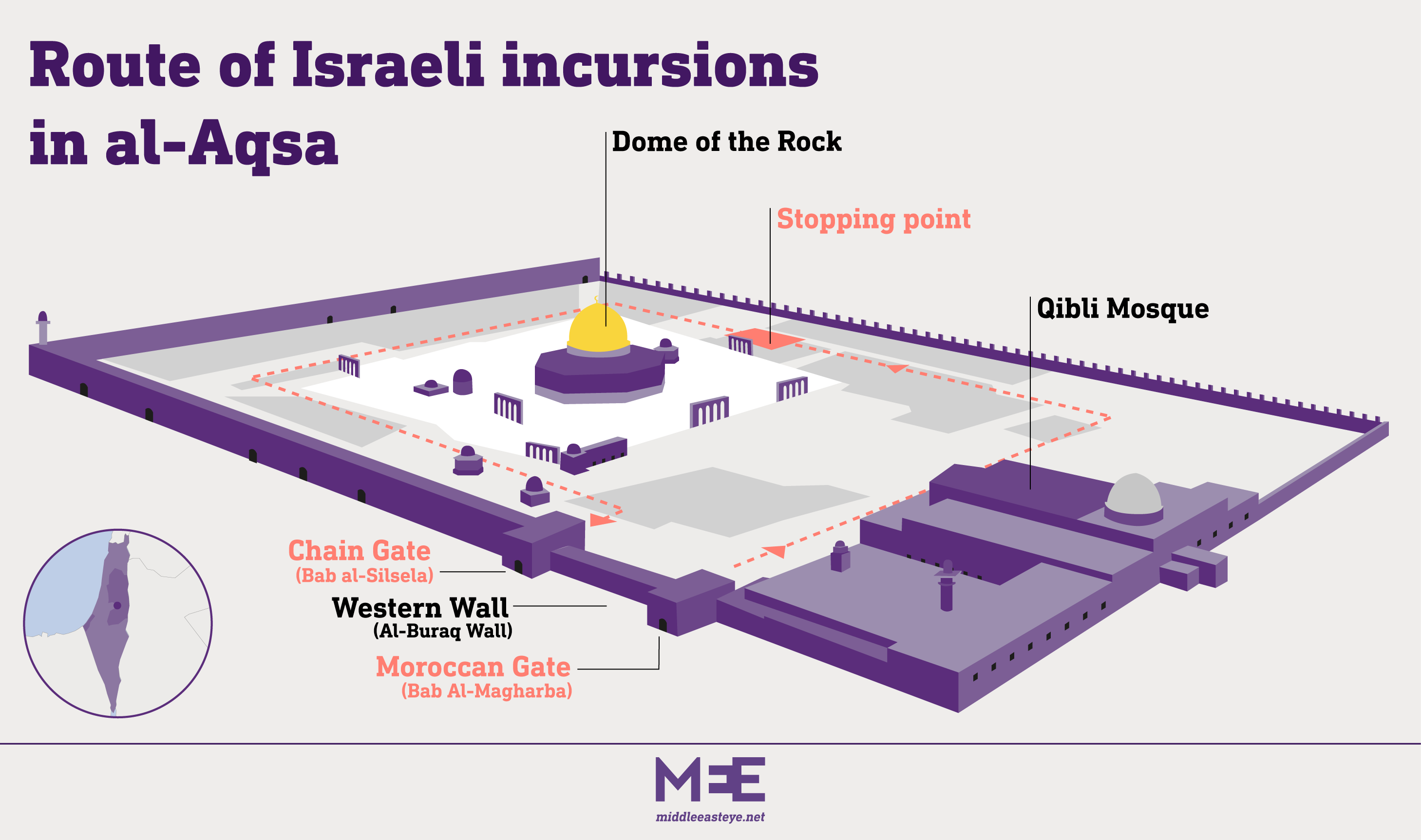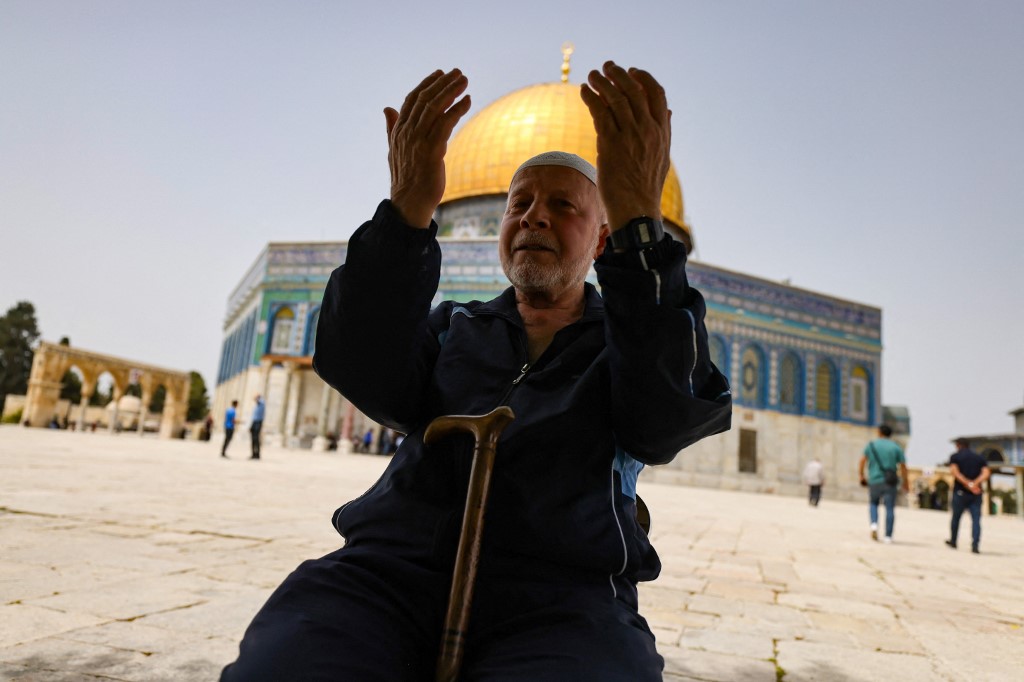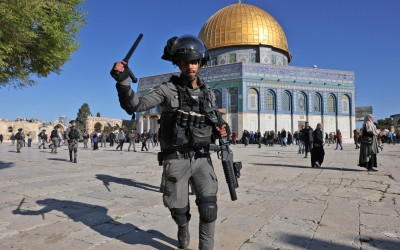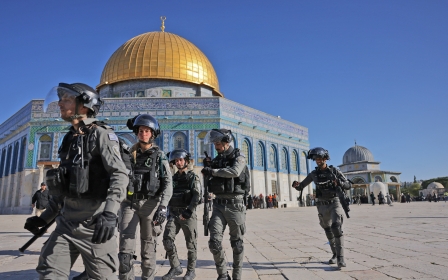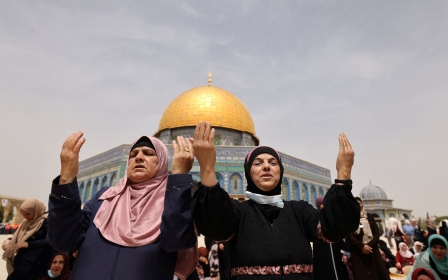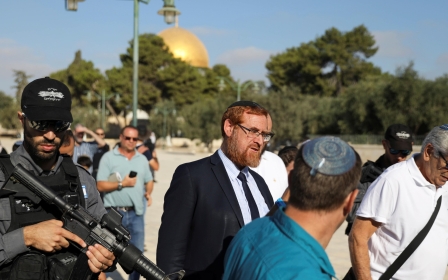Israeli forces storm al-Aqsa Mosque for second time in 48 hours
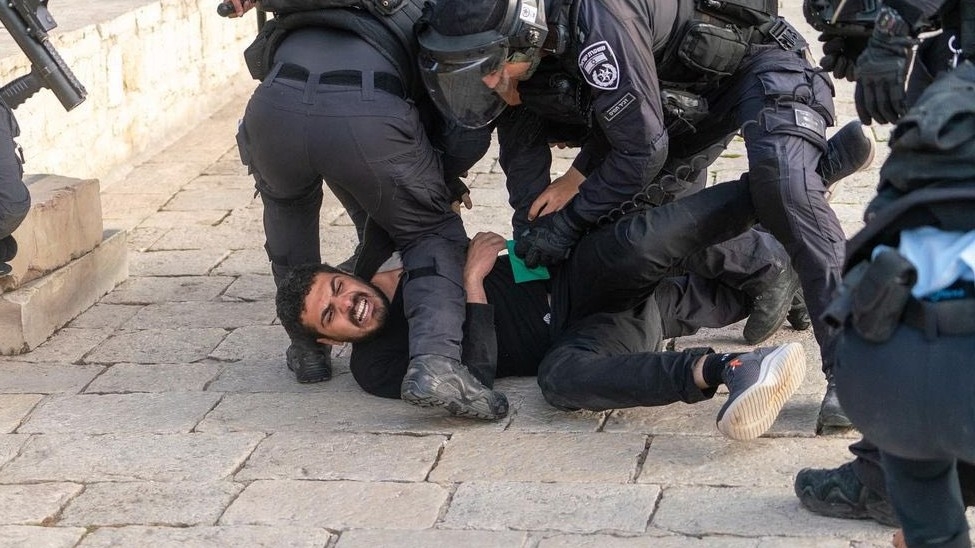
Israeli forces stormed al-Aqsa Mosque early on Sunday, assaulting and blockading Muslim worshippers inside prayer halls while clearing the way for Israeli settlers to enter the occupied East Jerusalem holy site.
At around 7am local time, hundreds of special forces entered the mosque's courtyard and began striking Palestinians observing Ramadan with batons in a bid to force them out. There were also reports of stun grenades being deployed.
In the silver-domed Qibli prayer hall, Israeli forces fired teargas at worshippers and blocked them indoors for almost four hours. Dozens of people were trapped inside and were not able to evacuate those who sustained minor injuries.
The Palestine Red Crescent Society (PRCS) said its medics were also prevented from entering the mosque to provide first aid.
New MEE newsletter: Jerusalem Dispatch
Sign up to get the latest insights and analysis on Israel-Palestine, alongside Turkey Unpacked and other MEE newsletters
People trapped inside the Qibli hall pleaded for help using loudspeakers, urging Palestinians to come and protect the mosque. Israeli forces reportedly tried to access the audio room afterwards to cut off the sound system, which was later repaired by the mosque's volunteers.
Inside the Dome of the Rock hall at the centre of the mosque's complex, female worshippers were also blocked in and not allowed to leave in a similar manner.
"We wanted to go outside to protect al-Aqsa but the police closed the doors on us," Sahar Natsha, a Palestinian women who was trapped inside the Dome of the Rock for four hours, told Middle East Eye.
The mosque's guards also told worshippers not to open the doors and attempt to leave, fearing that Israeli forces would shoot stun grenades which could set fire to the carpets, Natsha said.
"We felt devastated and angry," she added. "But in the end we were also glad that we were present. Had we left the prayer hall the police would have forced us out of the mosque altogether. We decided to stay steadfast to protect it."
Heavily protected settlers
All the while, hundreds of Israelis, protected by heavily armed forces, continuously stormed the courtyard of the mosque in different groups for the duration of the raid.
Far-right Israeli activists and settler groups had announced plans to storm al-Aqsa this week in large numbers starting from Sunday to mark the Jewish Passover holiday.
The Islamic Waqf, a joint Jordanian-Palestinian trust that administrates the affairs of al-Aqsa, recorded more than 500 settlers who entered in this period.
Far-right groups that organise these raids, in coordination with the police, call on Israel to assert full Jewish sovereignty over the site and allow Jewish worship and ritual sacrifice to take place.
Some also advocate for the destruction of the mosque, where they believe two ancient Jewish temples once stood, to make way for a third temple.
In the Old City outside al-Aqsa, some Palestinian men threw stones at buses carrying Israelis heading to the site, lightly injuring five. Israeli forces arrested two people in connection with the incident.
Small Palestinian protests took place near Lion's Gate in the Old City as the raid unfolded. Israeli forces injured at least 17 people, the PRCS said.
Before dawn, Israeli forces increased their presence outside al-Aqsa's gates and imposed restrictions on Palestinians trying to enter the mosque for prayer, eyewitnesses said.
'Violation of religious rights and sanctities'
With Passover lasting until the end of the week, settler raids accompanied by police assaults are expected to continue, Sheikh Najeh Bakirat, the deputy director of the Jerusalem Islamic Waqf, told MEE.
"All of these raids are attempting to change the reality on the ground and create a scared Jewish presence in al-Aqsa," Bakirat said.
"The [Israeli] state will never give up these raids because from the onset of its creation it has been working to erode this Islamic monument, which symbolises the Arabic and Islamic roots of the Palestinian struggle."
As part of an understanding between Jordan – the custodian of Islamic and Christian sites in Jerusalem – and Israel, non-Muslims can visit al-Aqsa but aren't allowed to pray there.
However, Israel has long ignored this delicate arrangement, often referred to as the "status quo" and bypassed the Waqf. In recent years, Israelis forces, settlers and high-profile politicians have almost on a daily basis raided the mosque without Palestinian permission.
The raids were often scaled-down and at times cancelled during Muslim holidays, such as in the holy month of Ramadan. However, this has changed in recent years and settlers also began to perform prayer inside the mosque during their incursions, which is a violation of the internationally agreed status quo.
The number of settlers entering the mosque has grown steadily over the years, causing alarm to Palestinians. In 2009, 5,658 settlers entered the mosque in such tours. In 2019, just before the Covid pandemic, the number rose to 30,000, according to some estimates.
Israel's control of occupied East Jerusalem, including the Old City, violates several principles under international law, which stipulates that an occupying power has no sovereignty in the territory it occupies and cannot make any permanent changes there.
'Al-Aqsa has been effectively split, both physically and at different times allocated to settlers. Anyone that tells you otherwise is lying'
- Umm Kamel el-Kurd, Palestinian activist
Umm Kamel el-Kurd, a veteran Jerusalem activist who was in al-Aqsa during the Sunday raid, said there has been a notable escalation in the manner and size of Israeli raids.
"The violations and injustice has reached new levels. What is happening is a catastrophe, it's unacceptable," el-Kurd, who is also known as Hajja Fawzia, told MEE. "This is a clear violation of religious rights and sanctities."
What happened today and will continue to happen in al-Aqsa, el-Kurd said, is another proof of the Israeli government's plan to divide the mosque between Muslims and Jews, similar to how the Ibrahimi Mosque in Hebron was divided in the 1990s
"Al-Aqsa has been effectively split, both physically and at different times allocated to settlers. Anyone that tells you otherwise is lying."
Calls for protests
Sunday's raid came as Palestinians marked the 16th day of Ramadan, the holiest month of the year for Muslims.
It followed another violent attempt by Israeli forces to clear al-Aqsa of Muslim worshippers on Friday, in which more than 150 were wounded and at least 450 arrested as police fired rubber-coated steel bullets, teargas and stun grenades inside the courtyard and prayer halls of the mosque.
Shiekh Ekrima Sabri, the imam of Al-Aqsa, told MEE the Friday raid was a "premeditated and orchestrated attack" against Palestinians.
"They want to deter Muslims from coming to the mosque and allow Jewish intruders to storm Al-Aqsa," the 82-year-old said.
The raid was widely condemned by various Muslim-majority states, including Jordan, Turkey and Saudi Arabia.
Palestinians factions also lambasted Israel for the assaults, with some warning it of the consequences if such violations continued and urging protesters to take to the streets in various Palestinian cities.
Last year, similar violent raids on al-Aqsa, which coincided with protests against plans to expel Palestinians from Jerusalem's Sheikh Jarrah neighbourhood, sparked widespread demonstrations in the West Bank and within Palestinian cities in Israel and led to an 11-day war between Israel and armed groups in the Gaza Strip.
Israel's bombardment killed 256 Palestinians, including 66 children. In Israel, 13 people were killed by rockets fired from Gaza.
Additional reporting by Latifeh Abdellatif.
This article is available in French on Middle East Eye French edition.
Middle East Eye delivers independent and unrivalled coverage and analysis of the Middle East, North Africa and beyond. To learn more about republishing this content and the associated fees, please fill out this form. More about MEE can be found here.


